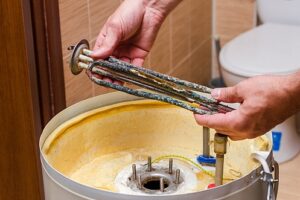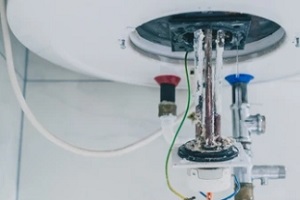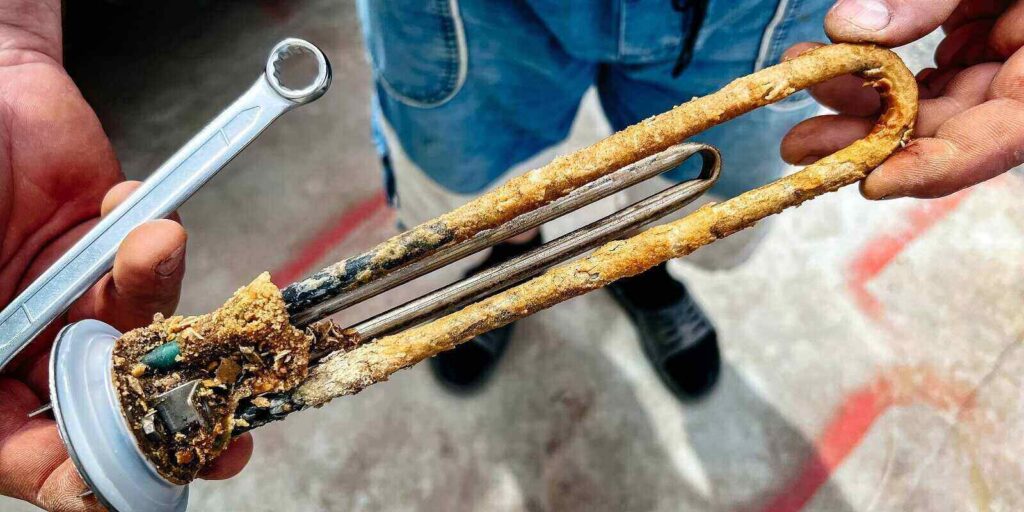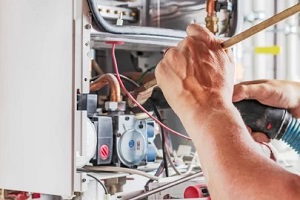
There are few moments in your daily routine that can be more frustrating than heading into the shower to get clean and unwind only to discover that your faucet will only supply cold water. This problem can typically be attributed to an electric hot water heater’s elements burning or shorting out.
The heating elements in any tank-style hot water heater operate around the clock to ensure your water remains at the ideal temperature for taking showers or baths, washing dishes and doing laundry. However, these water heater elements are prone to burning out and compromising the supply of hot water to your home’s appliances.
Here are some of the signs that you could have a bad heater element and that testing may be warranted:
- You’re not getting any hot water at all
- You are only getting a small amount of hot water
- The water does not get any hotter than lukewarm
- Your hot water runs out more quickly than usual
- The circuit breaker for your water heater is constantly tripping
In many cases, it is the lower heating element that breaks down first, but there are some instances where the upper element could be to blame.
A lack of hot water or hot water failing to reach the temperature that is set on the thermostat could point to a bad upper heating element, while hot water running out faster than usual or only being able to get a small amount of hot water from your tank may point to a bad lower heating element.
Here is a look at how you can determine which element needs to be replaced so that you can get back to taking warm and soothing showers quickly. To perform this simple test, you will need a screwdriver and a multitester.
This inexpensive tool can be purchased in a home improvement center and measures amperage, voltage and resistance. It is a useful tool to have in your house because it can also check batteries.

Turn Off The Power
Before you can check what is going on inside, you need to turn the power off completely by turning off the circuit breaker that supplies power to the hot water heater. Some units are wired to plug directly into a wall socket, and unplugging them is enough to turn off the power. However, most units will be hard-wired directly into the circuitry of your home, so it is important to turn the breaker for the hot water heater to the off position at your home’s main electrical panel.
Measure Resistance With A Multitester
Next, you will want to remove the two wires that are connected to your water heater element and push them out of your way. Then, unscrew the mounting hardware using a screwdriver so you can slip the wires out and then bend them out of your way. Set your multitester to measure resistance in ohms. The ohm key is often written in green and indicated using an Omega sign on the tester. You should set the scale to its lowest readings, which will usually be RX1 or RX1K.
Next, touch one probe on the multitester to each of the screws on the element. If you get a maximum reading or no reading at all, it means that the element in question is bad.
However, keep in mind that elements do have some resistance, so readings between 10 and 16 ohms is normal for many hot water heaters; elements marked as having 3500 watts tend to have higher ohm readings while those with 5500 watts will typically display lower readings.
Your element’s wattage will be printed on the plastic block that is situated between the two screws to which the wires were attached.
Then, touch one probe to one of the elements’ screws and the other probe to the bare metal of your water heater. A slight movement of the needle on your multitester or any ohm reading will indicate that the element has shorted out.
Next, check the screw on both elements. Touch one probe to the element screw and the other to the element’s metal frame, taking care not to touch the other screw with it. If you see any movement of the needle or a reading, that indicates the element has shorted out. You should then check each screw on both elements using the same process.
Keep in mind that hot water heaters typically run using a 240-volt current. This can cause painful electrical shocks and other types of damage if you are not careful. Ensure that the unit’s power is turned completely off before you attempt to carry out any resistance tests.
Get In Touch With The Northern Virginia Residential Plumbing Professionals
Although testing water heater elements is relatively straightforward, it is best to leave this job to the experts.
At Baumbach Plumbing And Remodeling, our licensed, bonded and insured plumbers have the experience and tools needed to diagnose all manner of water heater problems and recommend the best course of action to restore hot water to your home as quickly as possible. Reach out today to learn more about our affordable services.







